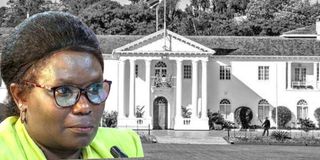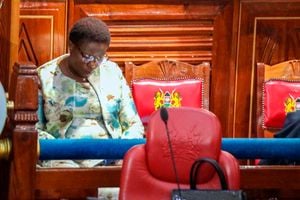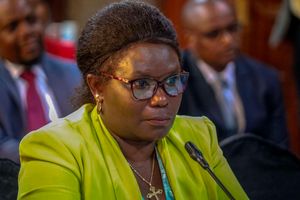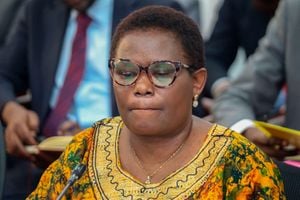
Ousted Meru Governor Kawira Mwangaza.
A visit to State House and “political interference” saw the Senate vote to send Meru Governor Kawira Mwangaza home, even as a last-minute attempt at saving the embattled county boss by female colleagues failed.
With the impeachment trial on a knife-edge, Ms Mwangaza’s critics pulled a first one on her by galvanising senators along political lines.
Sources privy to the machinations behind the impeachment say a team of politicians from Meru County went to State House on Monday and reportedly pleaded with President William Ruto to stay clear of the matter.
Emboldened, the group then approached a Kenya Kwanza senator holding an influential House leadership position and tasked the lawmaker with mobilising 28 senators drawn from the ruling United Democratic Alliance (UDA) to its side, a number enough to send the 50-year-old home. The threshold for upholding the charges is 24 votes in support.
“The leaders who went to State House were mentioned during the impeachment hearing. They pleaded with the President not to take a position on the issue. This gave them the leeway to mobilise along party lines,” one of the sources told the Daily Nation.
The source said female governors attempted to reach out to the President but Dr Ruto is said to have remained non-committal. Kenya Kwanza Alliance enjoys the support of 30 senators after six lawmakers in the opposition vowed to work with the ruling alliance, adding to the 22 UDA senators and one each of Ford Kenya and the Democratic Party.
Twenty-six senators
Azimio has 17 senators, with 13 from the Orange Democratic Movement (ODM), three from Wiper Party Wiper and Busia Senator Okiya Omtatah’s National Reconstruction Alliance.
When the voting was called by Speaker Amason Kingi, 26 senators voted in support of the first charge of gross violation of the Constitution and other laws while four were against. There were 14 abstentions.
The 26 senators voted in support of the second charge of gross misconduct with two against. The abstentions were 14.
On the third charge of abuse of office, some 27 senators voted in support, one against while 14 abstained.
Voting was not without drama as chaos broke out in the House, with lawmakers engaging in shouting matches.
Nairobi Senator Edwin Sifuna went to the extent of referring to Mr Kingi as “an embarrassment”.
Nominated Senator Gloria Orwoba was ordered out of the House for protesting failure to allow debate before voting.
With debate on the impeachment motion stifled, Azimio senators and some nominated ones from Kenya Kwanza took issue with the direction things were moving.
Subsequently, opposition senators refused to take part in the voting. They were joined by Kakamega Senator Boni Khalwale (UDA).
State House made calls
Elgeyo Marakwet Senator William Kisang also broke ranks with party colleagues as he voted against the charges. His vote, however, did not count because of a technicality raised by Mr Kingi.
“We were informed that people from State House made calls. UDA senators were told to ensure Mwangaza is removed as governor. MPs are not independent. Kenya is cooked,” Kisii Senator Richard Onyonka said.
“It was the UDA side that sent her home. Like many, I believe the charges were not high crimes and misdemeanours.”
Homa Bay Senator Moses Kajwang added: “Azimio refuses to be drawn into petty political wars that violate the Constitution and the rule of law.”
Vihiga Senator Godfrey Osotsi said he and others saw interference by UDA in the voting.
“UDA had a party position at the eleventh hour. They were looking at the balance of power in Meru. It was not about the weight of the charges,” he said.
Contacted, Kirinyaga Senator James Murango denied the claims, saying senators voted on individual capacity and not on the dictates of the party.
“The governor extended her luck too far. We were sitting as judges and every senator processed what he or she heard,” Mr Murango said.
During the trial, Mitunguu Ward Representative Evans Mawira said Senate Deputy Speaker Kathuri Murungi and Buuri MP Mugambi Rindikiri were involved in a scheme that led to the second impeachment of the governor.
The former Meru County Assembly Majority Leader and mover of the second impeachment motion last year became Ms Mwangaza’s witness.
Mr Mawira said he was called by UDA leaders in the county to execute the plot, which saw every supporting MCA pocket at least Sh80,000.
He added that a meeting in Nanyuki, Laikipia County, called before Christmas in 2023 agreed on re-introducing an impeachment motion against Ms Mwangaza in or around June this year.
The meeting, he said, was attended by all Meru County MPs as well as immediate former Agriculture Cabinet Secretary Mithika Linturi.
Mr Mawira said 59 ward representatives who had backed the second impeachment motion were urged to remain united.
While making her submissions, Governor Mwangaza accused Senator Murungi of being behind her woes despite several efforts at reconciliation.
Dr Khalwale said some serious debaters in the ruling Kenya Kwanza coalition joined the “hysteria” of voting without interrogating the matters at hand.
The Kakamega senator said mobilisation could have taken place because impeachment is a legal and political process.
“Politics might have overwhelmed some of our debaters. If there was mobilisation, it might have been along political lines and was intended to achieve a particular outcome,” the Senate Majority Whip said.
Political players
“It was stated that some political players in Meru went as far as paying every MCA to impeach the governor.”
Dr Khalwale said impeachment of a governor should not be child’s play. He added that it should address gross violation of the Constitution and not maladministration.
“If we make impeachment easy, we will not have governors. If the governor is being sent home because 20 cows died in Meru, then President Ruto should be impeached because thousands of cows died last year,” the senator said.
Mr Onyonka said the particulars of the charges are the same the Senate has been raising against governors, terming them administrative issues.
“Governors dismiss workers, pay people using the manual system and hire relatives and friends. Why haven’t we impeached the remaining governors?” Mr Onyonka asked.
“Why was the Speaker rushing the hearing and not allowing us to interrogate the issues raised? He was talking about timelines but we can change that. That is why we refused to vote.”
Dr Khalwale wanted to know why senators were denied the chance to seek clarification after submission by counsels of both parties as is the norm.
He argued that some of the matters canvassed during the hearing were still in court.
“I did not want to sanitise an illegality as I had reservations on the charges. Some of the matters had already been concluded in the previous impeachments. They had not been substantiated and there were no attempts to do,” he said.
Mr Osotsi said there were illegalities and irregularities in the process, which the Azimio side raised and demanded the direction of the Speaker.
“The charges did not meet the minimum threshold of impeaching a governor. They were frivolous. The Kenya Kwanza people said ‘no’ because of their party position,” he said.
“Azimio said the charges were not strong enough to send the governor home. We must set the bar high since impeachment is weighty.”










